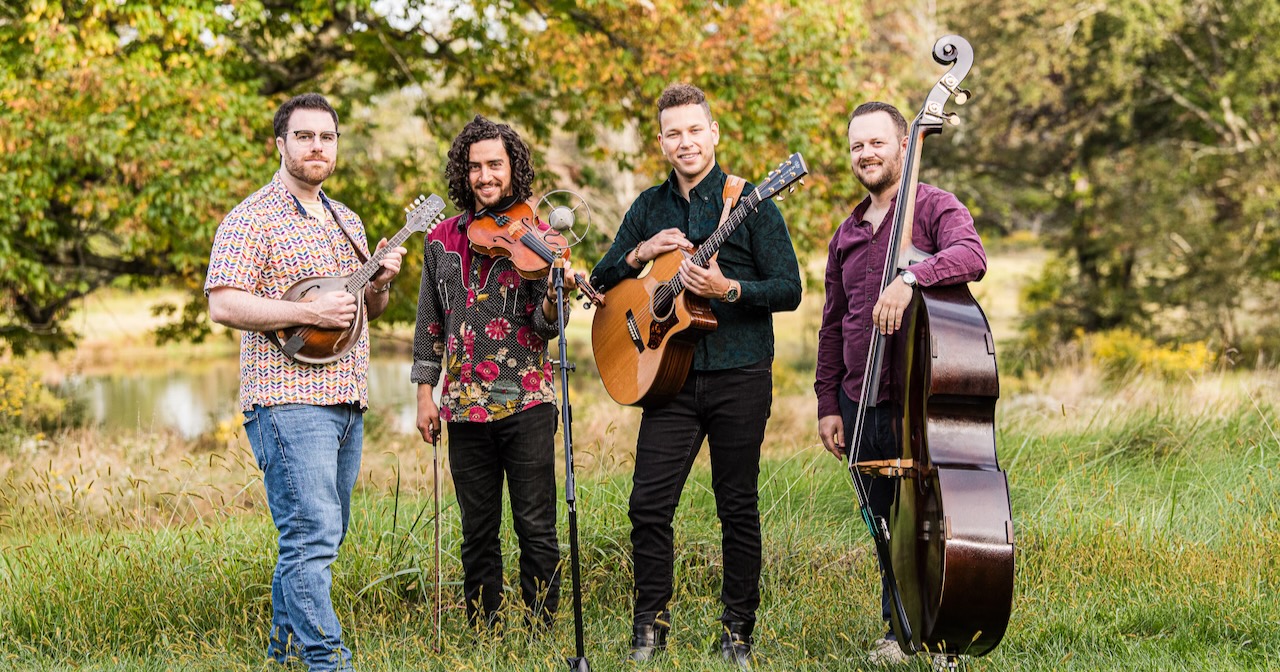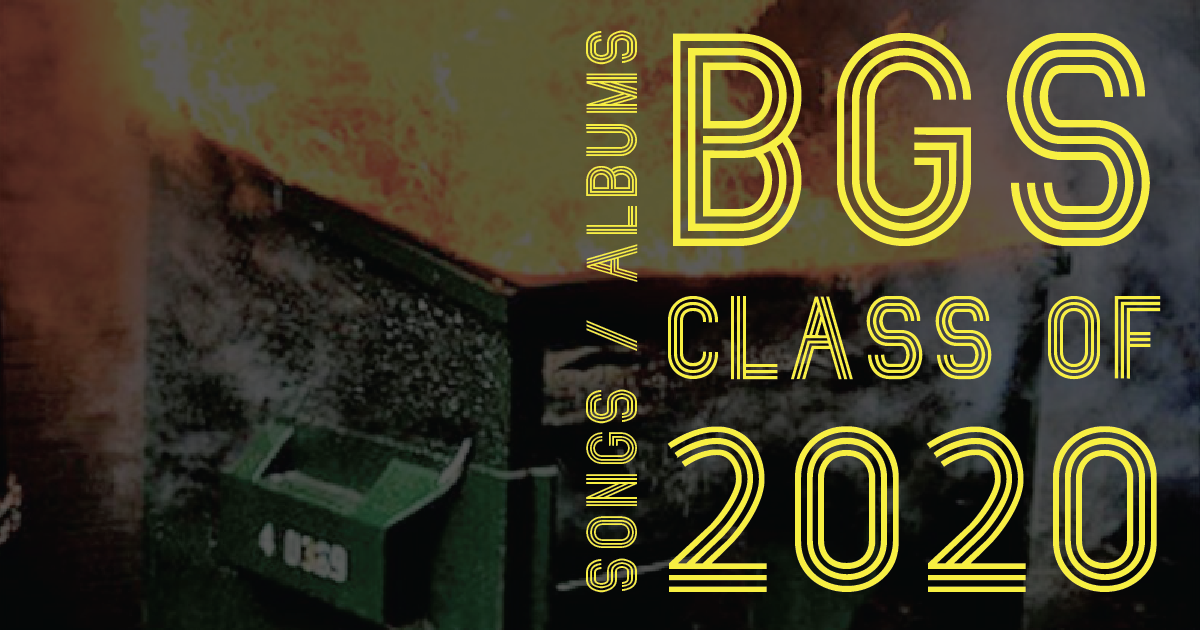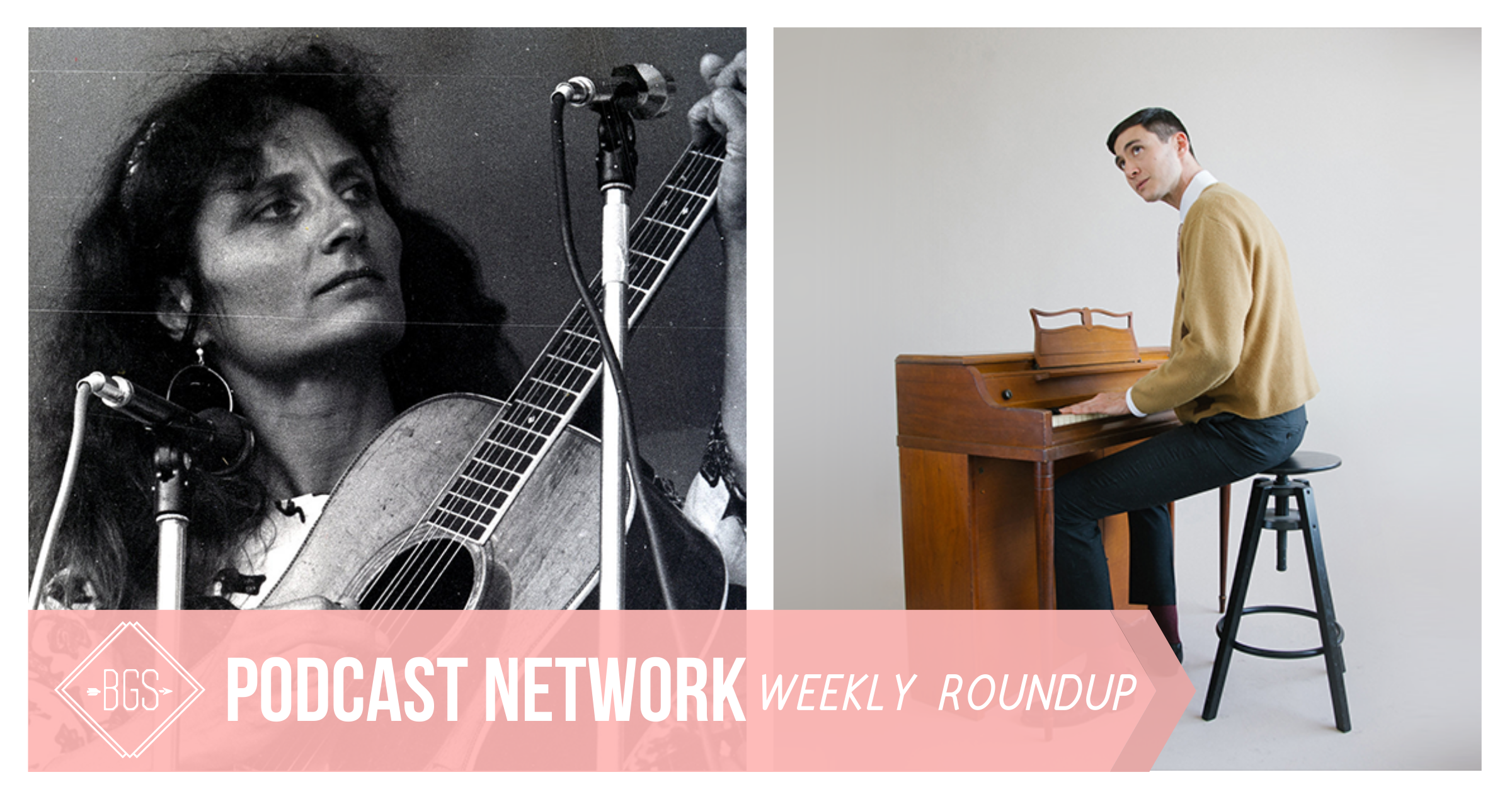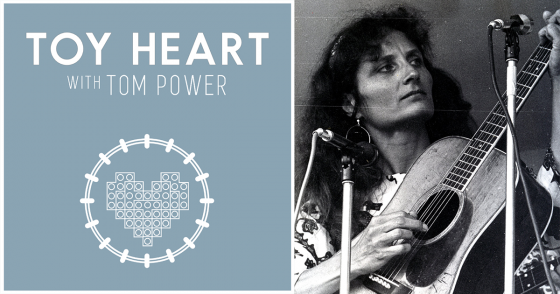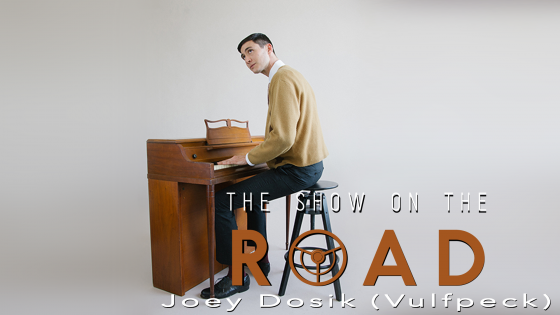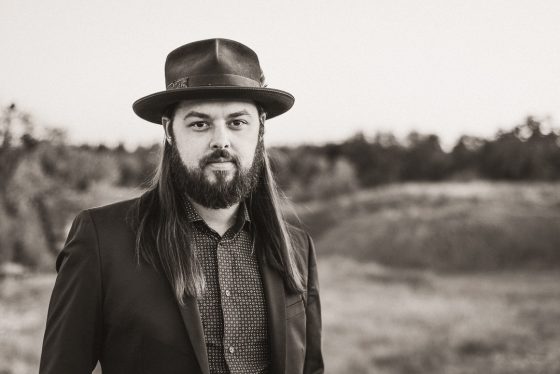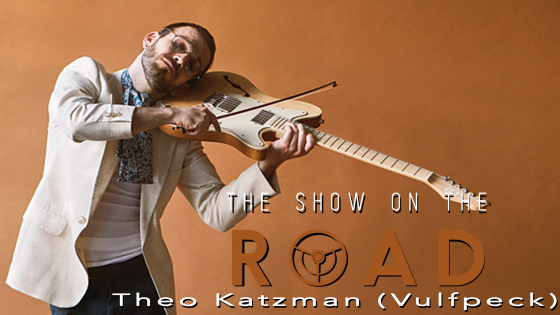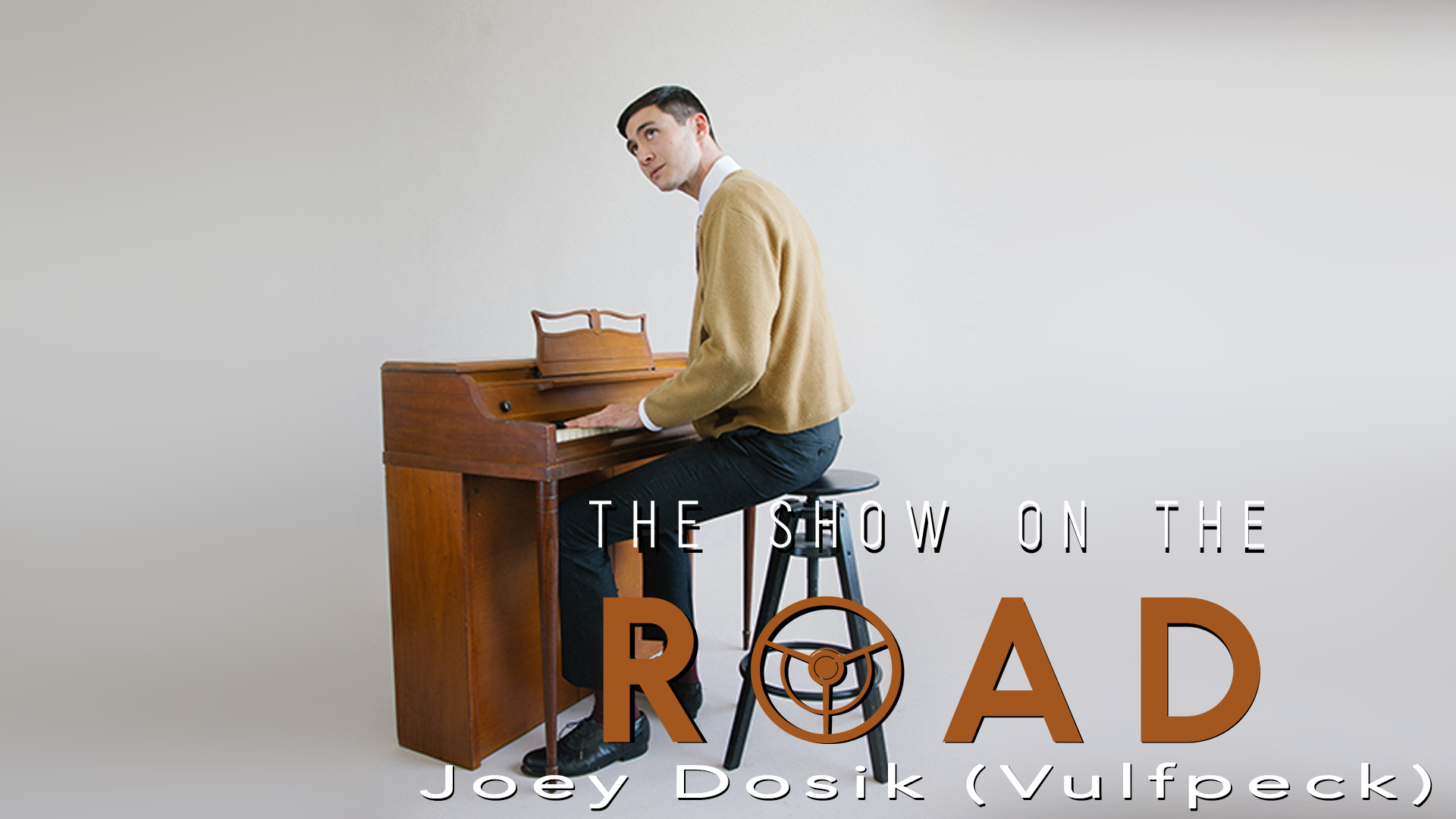While Boston may claim its title as the bluegrass capital of the Northeast, acoustic quartet On the Trail is living proof that the Connecticut bluegrass scene is not only alive and well, it is thriving. Composed of four impeccable musicians who each attended Western Connecticut State University to earn vastly varying degrees, On the Trail weaves together an uncommon collection of backgrounds to deliver a unique sound.
Drawing inspiration from opera to the Beatles to jazz, these four achieve a sonic richness that will leave listeners edified and enamored. True to their band’s name, they trailblaze full force with the release of their first full-length album, Where Do We Go from Here.
BGS recently had the pleasure of sitting down with Tom Polizzi (mandolin, guitar, vocals), Matt Curley (bass, vocals), Charlie Widmer (guitar, vocals), and Austin Scelzo (fiddle, vocals) to discuss all things On the Trail.
Congrats on the new album! Will you tell me a little bit about how you all ended up in a bluegrass band together?
Tom Polizzi: Well for me, I was a really, really serious jazz guitar player for a number of years – it was my whole life. Then around the end of high school I started to get a little more disillusioned with what jazz was about and where that could take me in life. I knew about Chris Thile, though weirdly I didn’t know about mandolin’s association with bluegrass, but I knew I was really interested in mandolin, the tone and potential of the instrument. I got a little $400 scholarship from the music department at my high school and bought myself a mandolin as a graduation gift for myself.
I learned to play walking around a camp that I worked at that summer with the thing on my back, playing while I walked anywhere around the camp. I remember standing somewhere at that camp with the mandolin and someone asked, “Do you want to play a bluegrass tune?” I was like, “A what?” And then they taught me “Cherokee Shuffle.” From there, I just started learning fiddle tunes and while in college I pretty much gave up on jazz aspirations. Even though I got my scholarship to school with jazz, I just kind of started playing Doc Watson and bluegrass tunes and the rest is history.
Austin Scelzo: My background was in classical violin. I learned to read [music] growing up in school orchestra and then went on to study it in college. But in the summers of my later high school years, I got sent to those iconic fiddle camps that get so many people in the door and that opened up my whole world to non-classical playing, which eventually propelled me into spending my summers in college exploring different music camps and festivals. My freshman year of college I went to Grey Fox, my first bluegrass festival. And throughout college, I started playing in a bluegrass country group locally. I would play classical music in school systems and then spend summers floating from festival to festival, living out of my car and really digging into the bluegrass stuff, which over time grew to become my primary musical expressive tool. So between the classical/arranging mindset and my investment in traditional bluegrass, that’s kind of where my musical tastes lend themselves to this group.
Charlie Widmer: Austin and I met when I was 19 years old – he’s actually the one that married my wife and me; he got ordained for it. We’ve known each other for such a long time. I had auditioned on a whim for a musical at 16. Didn’t know I could sing. They were doing Grease and I had a crush on a girl at the time. I went into that room and I met my now-wife, that same day at the audition, and I ended up getting the lead role. And then that kind of spiraled into more musical theater and trying to get into music school.
When Austin and I met, I was in school for classical singing and we were both interns at a church in Ridgefield [Connecticut], where we were both paid section leaders in the choir. After about a year of working together, somehow we ended up sitting next to each other. You know, we were in an a cappella group together, lots of different choirs, all these classes, but we just hadn’t connected. But as soon as we sat next to each other it was clear that we were getting along.
And so, fast forward five years, I was in the middle of a gig with my hip-hop soul band. I’d been doing stuff as a front man for a hip-hop soul group and it was awesome. I’m drenched in sweat, and Austin and I are talking in the break and I say to him, “Hey, man, I’ve been listening to Chris Thile and his group, Punch Brothers, and they’re sick, man. If that’s, like, a possibility in bluegrass, I’d love to do something where I’m playing guitar – let me know if a gig pops up.” We kind of agreed that he needed another year to finish school and get settled into being a teacher and everything. And a year later, almost to the day, he said, “I got us something if you want to drive.” It was perfect timing. My other group was falling apart. When this started, it just kept working and going. I don’t think any of us ever thought at that point, six years later we’d be here with an album.
Matt Curley: I was the last member to join On the Trail and I’ve been in the group for about three-and-a-half, four years now. I started playing guitar when I was in middle school and in early high school, I was playing in punk rock bands. When I got to high school, I really wanted to play in the jazz band playing guitar, but the guitarist was very good, So I thought, “I’ll play bass. It’s easy, it’s four strings.” Then the band director points to the upright bass. I remember thinking, “No, no, not that one!” So during that rehearsal it was the first time I ever played upright, and I eventually came back to the bass.
I’m the kind of guy who’s switched instruments several times. I switched to percussion, joining the drum line. I ended up marching drum corps for a few years, which led me to majoring in percussion at WestConn and then to get my master’s degree in Tennessee, right outside of Nashville, in classical percussion performance. For a while I thought I was going to be in professional orchestras, as I was training and practicing to take auditions for triangles and cymbals. Glad I didn’t do that. Then I started teaching band down there in Tennessee and I ended up moving back up here. I was teaching and Austin was the orchestra teacher in the same school, so we started jamming. Up to this point, I knew nothing about bluegrass. Even living in Nashville for a while, I knew nothing about bluegrass. Then I just happened to own a bass, so that led to me showing up to an On the Trail rehearsal. Here we are, three and a half years later.
CW: We also had a banjo player with us for the first three years, Chet, who was from Mississippi and originally grew up in Nashville. Chet lent a hand on some of the songs, even on the album. He got a doctoral offer to go down to Florida and get his doctorate in philosophy. He’s a genius, really such a smart guy – we always hope that Chet will join us again. We just always have a lot of fun together. I think that can be rare in groups.
Absolutely. Y’all have amazing chemistry and it’s evident. You recently released the band’s first full length album, Where Do We Go from Here. What are you each proudest of on the album?
TP: I think the fact that I actually wrote songs with lyrics and they made it somewhere. After I finished school with an audio engineering degree, I did our whole first EP – all of the editing, mixing, mastering – myself. And with this record, I felt like that kind of stuff culminated in a different way, where I knew how to be on the other side of the booth, so to speak, in a way that was productive. I think I was able to help us keep the sessions thoughtful and productive throughout, from a perspective of final product.
I also love that I’ve got a couple of very sad or introspective songs on the album, one of which my fiancée didn’t know I had written. We were on the phone with her mom and she was talking about “Help Me” on the album. She said something along the lines of, “This is so devastating. Tom, you really wrote something beautiful.” And Claire goes, “You wrote that devastating song about heartbreak and loss?!” I had all these things written years ago after I broke up with my ex-girlfriend. Claire had never heard it because I don’t sing it – Charlie sings it on the record and we don’t play it at shows very much. She didn’t know I was capable of even having such sad words in my brain.
AS: I love that this album captures three or four original songs from each of us. My three songs all have a really different feel than anything else I’ve put out and they all mean something really powerful to me. They each capture a timestamp of a part of my life. The title track, “Where Do We Go from Here,” was one of the last songs we recorded, and one of the last songs that we even talked about putting together. It almost didn’t make the album at all. But we’re so proud of that track. That’s the song I’m by far the most pleased with. I also really like the way that “Trouble in My Soul” captured a different side of my voice that I’ve never captured on a record. It’s a lot more gritty, which is kind of cool, and then “Can’t Get You Out of My Mind” has some really nice moments too.
CW: For me, honestly I think the whole album is the pride point. When we did our first record, we had no clue what we were doing. I was really green to bluegrass in so many ways. Those first couple years were trial by fire, where I had no clue about any artists or vernacular and I was constantly terrified of every gig and jam. It felt like everyone was speaking a language. This record feels very full circle – we’d been talking about it forever. It really captures who On the Trail is. As songwriters, I think all of us have gained some confidence, though so much of that has come from just performing these pieces and getting positive feedback from the audience the last six years. When we started we didn’t know we had something, but our friends and family and even strangers told us to keep going. It just kept fueling us, you know? So, yeah, when I think about the proudest thing, it’s that we have this collection.
Given the diversity of musical backgrounds you each come from, where do you feel like your aligned priorities are? Do you have through lines about what you all prioritize and value musically?
TP: I would say one of the biggest factors that held us together is just that joy of making music. One of our biggest frictions, probably, is that diversity of background – even now, in the background of this interview, I’m just wrapping up my marketing job, my day gig, Matt’s driving home from teaching school, and Charlie and Austin both freelance more and do more things that are full-time music. A lot of it has been about finding that balance that brings us all joy and keeps us believing in what we’re doing. But you know, on our toughest days, what drives us ahead is that we love making music together, we love making music on our own and sharing it with one another.
CW: Yeah, as any musician knows, we’re always just chasing that incredible moment. We all share a true appreciation of music, and we are all deeply aligned regarding what exciting music feels like. When something’s hot, we all can agree immediately – it’s not even so much of a discussion.
AS: We’re all also pretty consistent with the vocal harmony, regardless of the song. No matter the arrangement, we value strong vocal harmony and strong vocal presence. So a big part of this group is understanding harmony to a point where we can get really good three-part and other types of arrangements.
TP: For probably the first year and a half, I didn’t sing a note in the band. Vocals have become such a big thing. I learned from these guys, who are and always will be better singers than I, but they coaxed it out of me.
MC: Same for me. I’ve never taken a voice lesson or anything and now I’m singing four or five songs. It’s incredible.
For our final question – you’re our One to Watch, but who are you watching right now? Any creatives, musical artists, or otherwise that are inspiring you right now? Could even be a TV show or a Tik Tok creator.
TP: I’m sure they’ve been featured here a lot, but someone who’s been talked about a lot in our band is AJ Lee & Blue Summit. We love them. We’ve played with them. We’re inspired by them. Lots of our friends just around here, you know, keep us moving. The Ruta Beggars are doing fantastic things. Cahaba Roots, High Horse – all of those guys have so much going on. And if you’re looking for a good TV show to watch, watch Shrinking, because it’ll just rip your heart out. Oh, and one sleeper album – if you love all the music that we’ve talked about, this is an album I’ve heard no one else talk about. Maybe I’m just not talking to the right people, but it’s an album called Passages by Ethan Sherman. It’s got Wes Corbett on the banjo, and Thomas Cassell plays amazing mandolin on that album. I found it very inspiring.
CW: For me, a constant, big influence in songwriting and sticking to your vision and making it work has been Theo Katzman, who’s one of the guys from Vulfpeck. His last record especially resonated incredibly. All of his records have, but that one was during the process of making my album, as well as On the Trail’s album, and it empowered just feeling brave enough to do what we felt was right for the music. He was a big inspiration.
Allen Stone is also a huge inspiration for me as a singer and as a songwriter and he just dropped a new project. I always come back to Nickel Creek and Punch Brothers. Nickel Creek’s last album, I thought, was stunningly brilliant and beautiful.
MC: It’s really a great time for bluegrass, country, and folk music, even in the Northeast, not just down south [or] in Nashville. There are a lot of groups that are getting really big here. I mean, we have a Connecticut group, North County Band, that is doing some good things. Another group that I played with this summer, Raquel and the Wildflowers, from the Poughkeepsie area, are also doing great things. Shout out to the Rock Hearts, the other group Austin fiddles with. They’re great too.
AS: I mean, I would definitely have to reiterate the bands that Tom mentioned. We’re so steeped in the New England scene, we play so many shows, and my best friends are in so many of these bands. We’ve been friends with the Ruta Beggars forever. I mean, they were my earliest experience seeing young people play bluegrass music at Grey Fox. I just love those guys – they are so hardworking. They just got signed this year and are doing awesome stuff.
I go to IBMA every year with the Rock Hearts and I see some of the upcoming bands, and every once in a while one will really strike me, and the one that struck me this year was Never Come Down. I got to hang out with them in Colorado and I was hanging with the Stillhouse Junkies, who have a new player from New England that just joined them this year, so they’re a quartet now. They’re doing some really cool new stuff. Another band is Della Mae, and they’ve been around for a really long time, but they’re still producing amazing new songs. I mean, some of the songwriting that comes out of the group has absolutely made me weep, multiple times. Some of the songs are unrecorded—they’re still building a repertoire that’s really meaningful and really powerful.
I think we always have an eye on Twisted Pine, too, who just came out with a new album, and they have all these really fun videos, too. They’re doing something that I think we hope to do as well, which is kind of keep a foot in the bluegrass door, but also step into spaces that bluegrass music hasn’t been to. I think our music is suited for that, to get it outside of the traditional festival circuit, the traditional concert series, and preserve the tradition we’re so grateful for while also being innovative.
Photo Credit: Courtesy of the artist.
